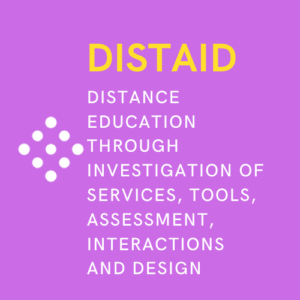Blog
DISTANCE EDUCATION THROUGH INVESTIGATION OF SERVICES, TOOLS, ASSESSMENT, INTERACTIONS, AND DESIGN
- 26 Marzo 2021
- Posted by: Enjoy Italy
- Category: Notizie

The COVID-19 pandemic has disrupted the routine learning schedule of the students. The active hours that they would be spending at school for learning is being spent at home which means they are left behind their routine learning activities. Challenges of Distance learning were much more disruptive on language lessons that require dual, equal and intense interactions between teachers and students as well as between student peers. Therefore, we decided to provide a first aid kit for the distance learning with “Distance education through Investigation of Services, Tools, Assessment, Interactions, and Design” (DISTAID) project to find efficient and attractive solutions for the obstacles of distance learning in ESL perspective.
DISTAID is a collaborative project among 5 partner institutions from Turkey, Romania, Poland, Portugal and Italy. “DISTAID” undertakes a key role of taking attention to online engagement strategies if applied for English teaching, learning and assessment purposes will help our learners to continuously involve themselves in the learning process and will also foster good study habits in them. All 5 institutions share common objectives, and will work together, both from a distance and during real meetings, to reach their aims.
During the period of the DISTAID, participants will enhance their capacity for the development and integration of digital technologies and online resources in ESL teaching. Then, they will create new online resources and compile the existing ones that can be used to enrich the ESL lesson content, including; a list of innovative online tools, online resource usage manual, “Distance Learning Best Practices” catalogue, English Teaching Program, website, report, posters and presentations. The project will also enhance pupils experiences of modern and future communication technologies through a series of intercultural dialogue exchanges on platforms where they will be given opportunities to see that distance is no longer a barrier to effective and immediate communication.
Now, more than ever, is the time to open up resources and share experiences to support the continuity of learning for all. The transnational structure of DISTAID will be a gateway to spread the learning solidarity as far and wide as we can, we will come out of the crisis as stronger learners empowered by digital. Teachers and students will have an opportunity to compare what is going on in their localities with other realities at a European and global level in order to confront opinions, as well as to find out different cultures, people and methods.
Students will work in mixed, international groups helping each other to complete the tasks by sharing their methodological and language competences as well as their knowledge, which will help to develop their skills further. The teachers from different countries will be able to create innovative tasks and develop new methodological approaches in teaching while sharing and comparing their national approaches and experience. E-twinning is going to be used as a way of long – distance communication and working and is planned to be a continuation after the project is over.
To implement our partnership and hit our objectives we have shared tasks amongst us according to each other’s experience and expertise. We’d like to take advantage of the resources we have at schools, meaning teachers, advisers, parents, graduates companies and institutions representatives (e.g. e-learning center, research and development centre), who have declared free help and consulting in the project. The project held 5 transnational meetings at which each partner prepared 2 good practice examples of digital methods, based on an evaluation grid, providing criteria for good digital teaching. The practices had been documented in a e-catalogue which is for free downloadable.
As a result, this partnership will not only help our learners (about four hundred) to develop spoken skills in foreign languages and build their European citizenship, but will raise their future social inclusion opportunities as well. Teachers involved (around fifty) will be given the opportunity to develop their language skills and learn how to incorporate innovative digital and ICT teaching tools in their practices and make their classes more engaging and more challenging for their pupils.
